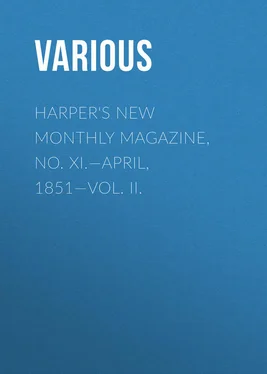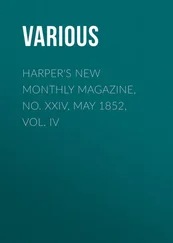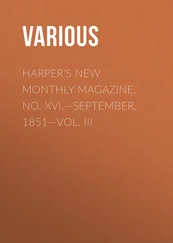Various - Harper's New Monthly Magazine, No. XI.—April, 1851—Vol. II.
Здесь есть возможность читать онлайн «Various - Harper's New Monthly Magazine, No. XI.—April, 1851—Vol. II.» — ознакомительный отрывок электронной книги совершенно бесплатно, а после прочтения отрывка купить полную версию. В некоторых случаях можно слушать аудио, скачать через торрент в формате fb2 и присутствует краткое содержание. Издательство: Иностранный паблик, Жанр: periodic, foreign_edu, на английском языке. Описание произведения, (предисловие) а так же отзывы посетителей доступны на портале библиотеки ЛибКат.
- Название:Harper's New Monthly Magazine, No. XI.—April, 1851—Vol. II.
- Автор:
- Издательство:Иностранный паблик
- Жанр:
- Год:неизвестен
- ISBN:нет данных
- Рейтинг книги:5 / 5. Голосов: 1
-
Избранное:Добавить в избранное
- Отзывы:
-
Ваша оценка:
- 100
- 1
- 2
- 3
- 4
- 5
Harper's New Monthly Magazine, No. XI.—April, 1851—Vol. II.: краткое содержание, описание и аннотация
Предлагаем к чтению аннотацию, описание, краткое содержание или предисловие (зависит от того, что написал сам автор книги «Harper's New Monthly Magazine, No. XI.—April, 1851—Vol. II.»). Если вы не нашли необходимую информацию о книге — напишите в комментариях, мы постараемся отыскать её.
Harper's New Monthly Magazine, No. XI.—April, 1851—Vol. II. — читать онлайн ознакомительный отрывок
Ниже представлен текст книги, разбитый по страницам. Система сохранения места последней прочитанной страницы, позволяет с удобством читать онлайн бесплатно книгу «Harper's New Monthly Magazine, No. XI.—April, 1851—Vol. II.», без необходимости каждый раз заново искать на чём Вы остановились. Поставьте закладку, и сможете в любой момент перейти на страницу, на которой закончили чтение.
Интервал:
Закладка:
Various
Harper's New Monthly Magazine, No. XI.—April, 1851—Vol. II
There is a freshness about the fame and the character of Mr. Irving, no less than about his writings, which enables us to contemplate them with unabated delight. Few men are so identified personally with their literary productions, or have combined with admiration of their genius such a cordial, home-like welcome in the purest affections of their readers. We never become weary with the repetition of his familiar name; no caprice of fashion tempts us to enthrone a new idol in place of the ancient favorite; and even intellectual jealousies shrink back before the soft brilliancy of his reputation. In the present Number of our Magazine, we give our readers a portrait of the cherished author, with a sketch of his sunny residence, which we are sure will be a grateful memorial of one, to whom our countrymen owe such an accumulated fund of exquisite enjoyments and delicious recollections. We will not let the occasion pass without a few words of recognition, though conscious of no wish to indulge in criticisms which at this late day might appear superfluous.
The position of Mr. Irving in American literature is no less peculiar than it is enviable. With the exception of Mr. Paulding, none of our eminent living authors have been so long before the public. He commenced his career as a writer almost with the commencement of the present century. The first indications of his rich vein of humor and invention that appeared through the press, were contained in the Jonathan Oldstyle Letters, published in the Morning Chronicle in 1802, when he was in the twentieth year of his age. His health at this time having become seriously impaired, he spent a few years in European travel, and soon after his return in 1806, he wrote the sparkling papers in Salmagundi, which at once decided his position as a shrewd observer of society, a pointed and vigorous satirist, a graphic delineator of manners, and a quaint moral teacher, whose joyous humor graciously attempered the bitterness of his wit. It was not, however, till the appearance of Knickerbocker, that his unique powers, in this respect, were displayed in all their vernal bloom, giving the promise of future golden harvests, which has since been more than redeemed in the richness and beauty of the varied productions of his genius.
The lapse of years has brought no cloud over the early brightness of Mr. Irving's fame. He has sustained his reputation with an elastic vigor that shows the soundness of its elements. At the dawn of American letters, he was acknowledged to possess those enchantments of style, that betray the hand of a master. His rare genius captivated all hearts. His name was identified by our citizens with the racy chronicles of their Dutch ancestors, and soon became associated with local recollections and family traditions. Born in a quarter of the town, whose original features have passed away before the encroachments of business, he has witnessed the growth of his fame with the growth of the city. The memory of Diedrich Knickerbocker is now immortalized at the corners of the streets, and in our most crowded thoroughfares. Even the dusty haunts of Mammon are refreshed with the emblems of a man of genius who once trod their pavements.
With his successive publications, a new phase of Mr. Irving's intellectual character was displayed to the public, but with no decrease of the admiration, which from the first had stamped him as a universal favorite. The Sketch Book, Bracebridge Hall, and Tales of a Traveler revealed a magic felicity of description, with a pathetic tenderness of sentiment, that gave a still more mellow beauty to his composition; while his elaborate historical work, The Life of Columbus, established his reputation for unrivaled skill in sustaining the continuous interest of a narrative, and in grouping its details with admirable picturesque effect. His later productions, illustrative of Indian life, and his still more recent works on the history of Mahomet and the biography of Goldsmith, are marked with the characteristic traits of the author, proving that his right hand has lost none of its cunning, nor his tongue aught of its mellifluous sweetness.
It is highly creditable to the tastes of the present generation, that Mr. Irving retains, to such a remarkable degree, his wonted ascendency. Other authors of acknowledged eminence have arisen in various departments of literature, since he won his earlier laurels, and many of them since he has ceased to be a young man, but they have not enticed the more youthful class of readers from the allegiance which was paid to him by their fathers. The monarch that knew not Joseph has not yet ascended the throne. Indeed many of the most true-hearted admirers of Mr. Irving were not born until long after the Sketch Book had made his name a household word among the tasteful readers of English literature. This enduring popularity could not spring from any accidental causes. It must proceed from those qualities in the author, which are the pledge of a permanent fame. If a foretaste of literary immortality is desirable on earth, we may congratulate Mr. Irving on the possession of one of its most significant symbols, in the unfading brilliancy of his reputation for little less than half a century.
We have already alluded to the use made by Mr. Irving of the historical legends of our country. Nor is this his only claim on the American heart. He is peculiarly a national writer. He has sought his inspirations from the woods and streams, the lakes and prairies of his native land. No poet has been more successful in throwing the spell of romance around our familiar scenery. Under his creative pen the lordly heights of the Hudson have become classic ground. The beings of his weird fancy have peopled their forest dells, and obtained a "local habitation" as permanent as the river and the mountains. His love of country is a genial passion, inspired by the reminiscences of his youth, and quickened by the studies of his manhood. He is proud of his birthright in a land of freedom. His protracted residence abroad has never seduced him from the ardor of his first attachment to the American soil. His favorite writings are pervaded with this spirit. Yet he betrays none of the prejudices of national pride. His patriotism is free from all tincture of bigotry. He scorns the narrowness of exclusive partialities. With genuine cosmopolitan tastes, he gathers up all that is precious and beautiful in the traditions, or manners, or institutions of other lands, finding materials for his gorgeous pictures in the ancestral glories of English castles, and the splendid ruins of the Alhambra, as well as in the quaint legends of Manhattan, and the adventures of trapper life in the Far West. This singular universality has given him the freedom of the whole literary world. As he every where finds himself at home, his fame is not the monopoly of any nation. He has his circle of admirers around the hearth-stones of every cultivated people. Even the English, who are slow to recognize a melody in their own language when spoken by a transatlantic tongue, have vied with his countrymen in rendering homage to his genius. His evident mastery, even in those departments of composition which have been the favorite sphere of the most popular English writers, has softened the asperity of criticism, and won a genial admiration from the worshipers of Addison, Goldsmith, and Mackenzie. In this respect Mr. Irving stands alone among American writers. Cherished with a glow of affectionate enthusiasm by his own countrymen, he has secured a no less beautiful fame among myriads of readers, with whom his sole intellectual tie is the spontaneous attraction of his genius.
His universality is displayed with equal strength in the influence which he exerts over all classes of minds. He has never been raised to a factitious eminence by the applauses of a clique.
Читать дальшеИнтервал:
Закладка:
Похожие книги на «Harper's New Monthly Magazine, No. XI.—April, 1851—Vol. II.»
Представляем Вашему вниманию похожие книги на «Harper's New Monthly Magazine, No. XI.—April, 1851—Vol. II.» списком для выбора. Мы отобрали схожую по названию и смыслу литературу в надежде предоставить читателям больше вариантов отыскать новые, интересные, ещё непрочитанные произведения.
Обсуждение, отзывы о книге «Harper's New Monthly Magazine, No. XI.—April, 1851—Vol. II.» и просто собственные мнения читателей. Оставьте ваши комментарии, напишите, что Вы думаете о произведении, его смысле или главных героях. Укажите что конкретно понравилось, а что нет, и почему Вы так считаете.












